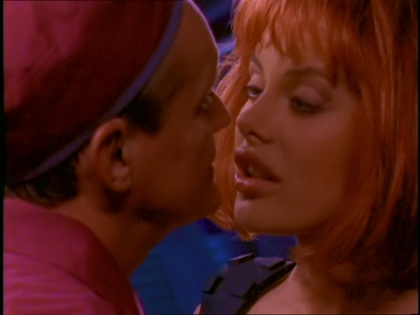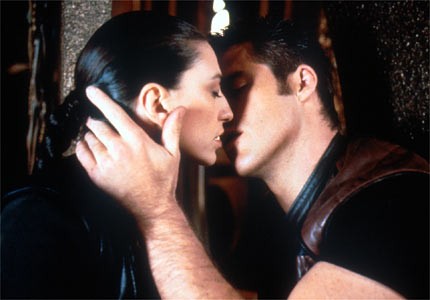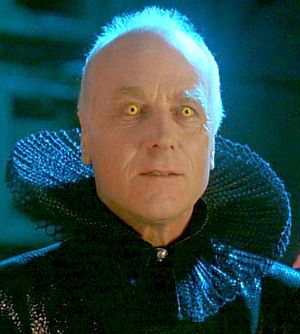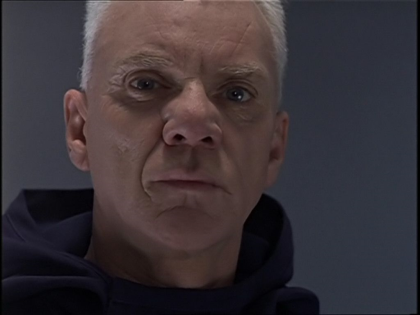Lexx And Farscape
Dec 30, 2013 22:32:20 GMT -5
🐍 cahusserole 🐍, ThisIsNotAnInternetMeme, and 2 more like this
Post by Douay-Rheims-Challoner on Dec 30, 2013 22:32:20 GMT -5
Introduction
Alien prisoners steal an organic, living spaceship right under the nose of an interstellar totalitarian regime. A band of misfits who can often barely tolerate each other (with raging hormones and a sexual frankness unusual for the genre), they screw around space mostly just trying to satisfy their own needs encountering a mixture of bizarre and demented aliens even if eventually they get caught up - however reluctantly - in the Bigger Picture, and have to make acts of heroism of dubious value in the face of galactic injustice. And while produced abroad it found a home in the US's Sci-Fi Channel.
..but am I talking about American-Australian co-production Farscape, or the Canadian-German co-production Lexx?
This is one of the oldest and most frequent comparisons between Farscape and another series. These series both aired more or less concurrently and had vicious arguments between the two sets of fans, to the extent that if a casual viewer has heard of one, they may have heard of the other in context of the first. The argument was even revived on the AV Club's Farscape boards for the review of Farscape's premiere... though given the comparative irrelevance of both programs today (and Lexx especially) it can feel like an increasingly obscure fight, lost in the cobwebs of Web 1.0, back in the days of scrappy Geocities fansites and when forums not much unlike this one were the focal point of conversation. Hell, marvel at this argument about the two shows respective ratings I found, as if on an archaeological dig to find the ancient Aol civilization:
The proof is clear: Lexx carried Farscape
Truly, a different, simpler era. Frankly it was a surprising boon to see Abed acknowledge Farscape's existence on Community (in a plot that, had it occurred in season three, would have just replaced 'Farscape' with 'Inspector Spacetime'); but it'll be a cold day on Fire before any television anywhere acknowledges this rather more obscure red-headed stepchild of the Sci-Fi Channel.
Nonetheless, the comparison between these two strands of decade old pop culture ephemera stand, and I, through my bleary recollection, will do my level best to provide a half-interesting opinion on it.
In short I feel it can be useful and misleading in equal measure. For example, the fundamental weirdness of Farscape and Lexx is exactly what set these programs apart from their peers, from the cozily familiar Star Treks and Stargates to the grim 'realistic' pessimism of Battlestar Galactica. Outer space is messy, baroque, grotesque, indulgent, disgusting, the interiors of the principal starships are not office spaces, the are the bowels of some extremely alien organism. And space is not just weird, it is cruel: Our protagonists are struggling losers, outcasts from a universe whose principal powers are ultimately only different shades of intensely disagreeable. There isn't even really any room for some Hero Faction, some comforting umbrella they could tuck themselves under like the Star Wars gang found with the Rebel Alliance. Most of the time it's just them and an indifferent, threatening world.
And our heroes?
These are people set into their roles by pure accident. Stanley Tweedle happened to be standing in the right place at the right time to accidentally receive the power to control the Lexx, something stolen by actual thieves who weren't lucky enough to see it to fruition. John Crichton accidentally hurls himself through a wormhole, kills the brother of a prominent Sebacean Commander and finds himself embroiled in a personal vendetta in a universe he barely understands. They unite with the rest of their crew not out of camaraderie, but sheer bloody minded necessity - a mutually hostile and bizarre reality forces people to act together who could just as easily have turned on each other long ago. And as they fool around mostly trying to benefit themselves (motivated by selfishness that can often be at cross-purposes), often defined by the least moral of them being an unscrupulous non-human not even 'played' by a person (the puppet Rygel, the prop Robot Head 790.) Yet in spite of that character the come together when needed, a bickering found family who protect their own.
So I guess it's inevitable the comparisons keep getting brought up. In the evolution of sci-fi TV they feel like a developmental dead end, a detour into pure gonzo space fantasy the likes of which isn't even considered anymore. But they're also extremely different shows that in some senses aren't even in the same kind of show at all.
Let's take sex, for example.
Sex, Relationships And What It's All About


Lexx's attitude towards sex (which has less nudity than viewers might remember - not to mention positively tame in an age of HBO) is built around frustration. Take the dynamic of the second season: Stan desires Xev, who rejects him as being old, ugly and cowardly. Xev is also desired by Robot Head 790, but as he is literally just a head, he is unable to be a realistic contender for her. Xev in turn lusts after the handsomely stoic Kai - but Kai is dead, incapable of desire. And then occasionally there is Lyekka, who choses the name and appearance of a woman Stan once desired, but who is truly just a person-eating alien plant thing who they keep around because her carnivorous desires prove useful when dealing with an unwelcome guest star. So, we are left with three characters who very much want to get laid but aren't going to get laid with each other (Xev is actually a virgin until around midway through the second season - a relic of her own repressed past life, as a woman literally reared in a box so that she may one day give wifely duties) and this drives pretty much all the sex-oriented plots, from the funny to the downright terrible (and some of Lexx's worst content is sexual, like legitimately awful worst-ever what-the-fuck television, as in the first season actually has gay rapists... and I think I can stop there.) Lexx's general attitude is like a dirty joke.
Farscape may snigger. And it may have Crichton bouncing around with Aeryn's chest when she isn't looking. But this show's approach to sex is much more about people having sex - and often - than it is for them frustatedly, lecherously yearning. Crichton and Aeryn have sex long before we ever reach a point where they could be considered in a relationship. Chiana - whose sexpot nature makes her the closest in Farscape's cast to Xev - is a promiscuous lover since long before we met her. The drama doesn't come from everyone refusing everyone else and getting all antsy about it, but what happens when they say yes, running the gamut from passionate romantic pairings to casual flings (and some events rather uncomfortably inbetween.) The show actually invests, emotionally, in the consequences of these engagements which is nothing Lexx is even remotely interested in, which leads me to a bigger point:
Farscape, at its heart, cares. It's emotionally invested in these characters. It has action and adventure and comedy but it's also a drama, about people living in this crazy messed up world, and when things go bad for them it is wrenching.
Lexx has a nihilistic, quasi-comedic detachment. It is a kind of dark satire less interested in being actually funny as it is being uncomfortably bizarre or perverted or vicious. There can be a kind of tragedy to it - particularly with Kai, who is the most classically romantic of the characters - but it's more of an absurd farce invested in its own insanity. If Farscape is Romeo and Juliet, Lexx is Tromeo and Juliet.
The Two Questions That Matter


But I've sort of written a lot of words without really getting to the sort of stuff people normally discuss.
Was Lexx really an influence on Farscape?
Lexx came merely two years before Farscape and the basic premise of the two shows were pretty similar... so was that intentional? This is a question not unlike the Babylon 5/Deep Space Nine controversies, with the implication that Farscape is a ripoff of Lexx. Truth is I don't have a bleeding clue one way or the other, but I do know that a lot of what Lexx had wasn't original - the essential premise of prisoners on the run from a totalitarian regime in an alien spaceship was one that also was a fixture of Blake's 7 (an acknowledged influence on Farscape) and even organic ships had - besides lit sci-fi - appeared on Star Trek and Babylon 5. I'm not saying an influence was impossible, but it's also possible Farscape emerged independently (and while Lexx premiered in 1997, Rockne O'Bannon had already conceived basic premise of Farscape - then called 'Space Chase' - in the early 1990s.)
But what about a question I can actually answer, like,
Which one is better?
Farscape is, for me, one of the best TV series I've seen. It has a love of the sci-fi genre that is infectious, toying around with familiar, even cliched narratives and frelling with them with gusto; mixed with effortless humour and fantastic performances and wonderful writing and all kinds of things. Farscape is one of the best rounded sci-fi shows out there - it manages the kind of epic interstellar plots with severe moral consequences I'd expect from Deep Space Nine and Babylon 5, the snarky, infectious humour of a Firefly or a Futurama and a commitment to passionate messed up interpersonal drama that is all its own.
Lexx is often one of the worst series I've seen, and I don't throw that phrase around lightly. When Lexx is bad it is unforgivably reprehensibly noxious (do I have to bring those guys up again? No? Good.) It is an utterly painful series to sit through for many of its most awful episodes. And yet in its better hours... it's just so committed to its own cosmically outre little narrative voice I got into it. Lexx, as bad as it gets, is a show that is always trying; wanting to carve out a nutty little niche of TV brings the garish, vulgar, weird old world of oddball cult film to TV, telling stories that are completely absurd (like one-armed robots destroying the universe) but doing so with a straight face and a surprising adherence to internal consistency. It's not even that the scrappy low budget show succeeds that often; one has to kind of appreciate what it's trying to do even as it fails. It's the kind of awful-to-okay show that scratches people the right way if for some horrible reason they're in its wavelength. Unlike other, more consistently good shows, it's never safe, and it's never bland.
***
...and that's it for now. If anyone wonders how regular these write-ups will be the answer is erratically.
However if people liked this one, I am thinking about comparing Fringe and Farscape my next article... which would probably actually interest people more, but I felt I needed this off my chest first.
Alien prisoners steal an organic, living spaceship right under the nose of an interstellar totalitarian regime. A band of misfits who can often barely tolerate each other (with raging hormones and a sexual frankness unusual for the genre), they screw around space mostly just trying to satisfy their own needs encountering a mixture of bizarre and demented aliens even if eventually they get caught up - however reluctantly - in the Bigger Picture, and have to make acts of heroism of dubious value in the face of galactic injustice. And while produced abroad it found a home in the US's Sci-Fi Channel.
..but am I talking about American-Australian co-production Farscape, or the Canadian-German co-production Lexx?
This is one of the oldest and most frequent comparisons between Farscape and another series. These series both aired more or less concurrently and had vicious arguments between the two sets of fans, to the extent that if a casual viewer has heard of one, they may have heard of the other in context of the first. The argument was even revived on the AV Club's Farscape boards for the review of Farscape's premiere... though given the comparative irrelevance of both programs today (and Lexx especially) it can feel like an increasingly obscure fight, lost in the cobwebs of Web 1.0, back in the days of scrappy Geocities fansites and when forums not much unlike this one were the focal point of conversation. Hell, marvel at this argument about the two shows respective ratings I found, as if on an archaeological dig to find the ancient Aol civilization:
The proof is clear: Lexx carried Farscape
Truly, a different, simpler era. Frankly it was a surprising boon to see Abed acknowledge Farscape's existence on Community (in a plot that, had it occurred in season three, would have just replaced 'Farscape' with 'Inspector Spacetime'); but it'll be a cold day on Fire before any television anywhere acknowledges this rather more obscure red-headed stepchild of the Sci-Fi Channel.
Nonetheless, the comparison between these two strands of decade old pop culture ephemera stand, and I, through my bleary recollection, will do my level best to provide a half-interesting opinion on it.
In short I feel it can be useful and misleading in equal measure. For example, the fundamental weirdness of Farscape and Lexx is exactly what set these programs apart from their peers, from the cozily familiar Star Treks and Stargates to the grim 'realistic' pessimism of Battlestar Galactica. Outer space is messy, baroque, grotesque, indulgent, disgusting, the interiors of the principal starships are not office spaces, the are the bowels of some extremely alien organism. And space is not just weird, it is cruel: Our protagonists are struggling losers, outcasts from a universe whose principal powers are ultimately only different shades of intensely disagreeable. There isn't even really any room for some Hero Faction, some comforting umbrella they could tuck themselves under like the Star Wars gang found with the Rebel Alliance. Most of the time it's just them and an indifferent, threatening world.
And our heroes?
These are people set into their roles by pure accident. Stanley Tweedle happened to be standing in the right place at the right time to accidentally receive the power to control the Lexx, something stolen by actual thieves who weren't lucky enough to see it to fruition. John Crichton accidentally hurls himself through a wormhole, kills the brother of a prominent Sebacean Commander and finds himself embroiled in a personal vendetta in a universe he barely understands. They unite with the rest of their crew not out of camaraderie, but sheer bloody minded necessity - a mutually hostile and bizarre reality forces people to act together who could just as easily have turned on each other long ago. And as they fool around mostly trying to benefit themselves (motivated by selfishness that can often be at cross-purposes), often defined by the least moral of them being an unscrupulous non-human not even 'played' by a person (the puppet Rygel, the prop Robot Head 790.) Yet in spite of that character the come together when needed, a bickering found family who protect their own.
So I guess it's inevitable the comparisons keep getting brought up. In the evolution of sci-fi TV they feel like a developmental dead end, a detour into pure gonzo space fantasy the likes of which isn't even considered anymore. But they're also extremely different shows that in some senses aren't even in the same kind of show at all.
Let's take sex, for example.
Sex, Relationships And What It's All About


Lexx's attitude towards sex (which has less nudity than viewers might remember - not to mention positively tame in an age of HBO) is built around frustration. Take the dynamic of the second season: Stan desires Xev, who rejects him as being old, ugly and cowardly. Xev is also desired by Robot Head 790, but as he is literally just a head, he is unable to be a realistic contender for her. Xev in turn lusts after the handsomely stoic Kai - but Kai is dead, incapable of desire. And then occasionally there is Lyekka, who choses the name and appearance of a woman Stan once desired, but who is truly just a person-eating alien plant thing who they keep around because her carnivorous desires prove useful when dealing with an unwelcome guest star. So, we are left with three characters who very much want to get laid but aren't going to get laid with each other (Xev is actually a virgin until around midway through the second season - a relic of her own repressed past life, as a woman literally reared in a box so that she may one day give wifely duties) and this drives pretty much all the sex-oriented plots, from the funny to the downright terrible (and some of Lexx's worst content is sexual, like legitimately awful worst-ever what-the-fuck television, as in the first season actually has gay rapists... and I think I can stop there.) Lexx's general attitude is like a dirty joke.
Farscape may snigger. And it may have Crichton bouncing around with Aeryn's chest when she isn't looking. But this show's approach to sex is much more about people having sex - and often - than it is for them frustatedly, lecherously yearning. Crichton and Aeryn have sex long before we ever reach a point where they could be considered in a relationship. Chiana - whose sexpot nature makes her the closest in Farscape's cast to Xev - is a promiscuous lover since long before we met her. The drama doesn't come from everyone refusing everyone else and getting all antsy about it, but what happens when they say yes, running the gamut from passionate romantic pairings to casual flings (and some events rather uncomfortably inbetween.) The show actually invests, emotionally, in the consequences of these engagements which is nothing Lexx is even remotely interested in, which leads me to a bigger point:
Farscape, at its heart, cares. It's emotionally invested in these characters. It has action and adventure and comedy but it's also a drama, about people living in this crazy messed up world, and when things go bad for them it is wrenching.
Lexx has a nihilistic, quasi-comedic detachment. It is a kind of dark satire less interested in being actually funny as it is being uncomfortably bizarre or perverted or vicious. There can be a kind of tragedy to it - particularly with Kai, who is the most classically romantic of the characters - but it's more of an absurd farce invested in its own insanity. If Farscape is Romeo and Juliet, Lexx is Tromeo and Juliet.
The Two Questions That Matter


But I've sort of written a lot of words without really getting to the sort of stuff people normally discuss.
Was Lexx really an influence on Farscape?
Lexx came merely two years before Farscape and the basic premise of the two shows were pretty similar... so was that intentional? This is a question not unlike the Babylon 5/Deep Space Nine controversies, with the implication that Farscape is a ripoff of Lexx. Truth is I don't have a bleeding clue one way or the other, but I do know that a lot of what Lexx had wasn't original - the essential premise of prisoners on the run from a totalitarian regime in an alien spaceship was one that also was a fixture of Blake's 7 (an acknowledged influence on Farscape) and even organic ships had - besides lit sci-fi - appeared on Star Trek and Babylon 5. I'm not saying an influence was impossible, but it's also possible Farscape emerged independently (and while Lexx premiered in 1997, Rockne O'Bannon had already conceived basic premise of Farscape - then called 'Space Chase' - in the early 1990s.)
But what about a question I can actually answer, like,
Which one is better?
Farscape is, for me, one of the best TV series I've seen. It has a love of the sci-fi genre that is infectious, toying around with familiar, even cliched narratives and frelling with them with gusto; mixed with effortless humour and fantastic performances and wonderful writing and all kinds of things. Farscape is one of the best rounded sci-fi shows out there - it manages the kind of epic interstellar plots with severe moral consequences I'd expect from Deep Space Nine and Babylon 5, the snarky, infectious humour of a Firefly or a Futurama and a commitment to passionate messed up interpersonal drama that is all its own.
Lexx is often one of the worst series I've seen, and I don't throw that phrase around lightly. When Lexx is bad it is unforgivably reprehensibly noxious (do I have to bring those guys up again? No? Good.) It is an utterly painful series to sit through for many of its most awful episodes. And yet in its better hours... it's just so committed to its own cosmically outre little narrative voice I got into it. Lexx, as bad as it gets, is a show that is always trying; wanting to carve out a nutty little niche of TV brings the garish, vulgar, weird old world of oddball cult film to TV, telling stories that are completely absurd (like one-armed robots destroying the universe) but doing so with a straight face and a surprising adherence to internal consistency. It's not even that the scrappy low budget show succeeds that often; one has to kind of appreciate what it's trying to do even as it fails. It's the kind of awful-to-okay show that scratches people the right way if for some horrible reason they're in its wavelength. Unlike other, more consistently good shows, it's never safe, and it's never bland.
***
...and that's it for now. If anyone wonders how regular these write-ups will be the answer is erratically.
However if people liked this one, I am thinking about comparing Fringe and Farscape my next article... which would probably actually interest people more, but I felt I needed this off my chest first.






